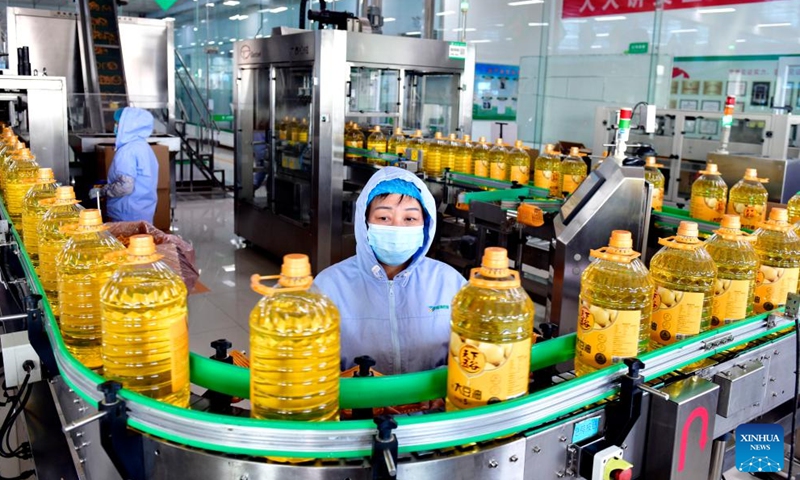
Employees work at a production line of a cooking oil plant in Boxing County, east China's Shandong Province, Nov. 26, 2023. (Photo: Xinhua)
The US has extended crackdown on Chinese companies from high-tech sectors to even low-end of value chains, as it is reported that US state senators seek regulatory crackdown on imports of used cooking oil from China. Chinese observers said US' intensifying protectionist practices are hindering the bilateral ties from returning to normal track, and will in turn cost high prices for US companies and consumers.
A group of US farm state senators is pushing for a regulatory crackdown on surging imports of used cooking oil (UCO) from China and elsewhere amid concerns some of the shipments could be fraudulent, Reuters reported on Friday.
US biofuels manufacturers have been importing an increasing volume of UCO in recent years to make products like biodiesel that can get lucrative US federal and state climate subsidies, but some of the cargoes may include virgin palm oil, a product linked to climate and environmental damage from deforestation, according to the report.
This is not the first time that American politicians have put their focus on China's UCO. Bloomberg reported in May that American industry groups and biofuel executives are urging the government to tighten scrutiny on the imports.
"The US is panic-stricken. It's unreasonable that China imports a large volume of soybeans from the US to make edible oil, whereas the US cannot bear Chinese companies' exports of UCO to the US," Ma Wenfeng, a senior analyst at the Beijing Orient Agribusiness Consultancy, told the Global Times on Friday.
According to data from the consultancy, China imported around 10 million tons of soybeans from the US in the first five months of the year.
The US is extending its Cold War mentality to the trade area, and its growing unilateralism and protectionism are the biggest hinder for bilateral ties returning back to normal track, Song Wei, a professor at the school of international relations and diplomacy at Beijing Foreign Studies University, told the Global Times on Friday.
As the UCO processing sector involves a large number of companies and creates a large number of jobs, the US' protectionist move will cause sweeping impact on the UCO industry and hurt US' employment market, Song said.
While the Biden administration just published proposed rules to curb new US investment in critical Chinese tech industries, it is reportedly investigating China Mobile, China Telecom and China Unicom over concerns that the three firms could exploit access to American data through their US cloud and internet businesses by providing it to Beijing.
Amid
continuous US crackdown and "decoupling" moves, Chinese enterprises' willingness to invest in the US has contracted, as a new survey released by the China General Chamber of Commerce in the US showed that over 60 percent of the surveyed companies reported a deteriorating business and investment environment in the US.
Experts said trade and investments remain the cornerstone of the China-US relations, calling for the US to objectively view bilateral economic and trade cooperation to achieve win-win results.
According to data released by China's General Administration of Customs, bilateral trade between China and the US reached $263.53 billion in the first five months this year, down 1.4 percent year-on-year, narrowing 10.2 percentage points compared with the whole year of 2023.
"The global market is big enough for both China and the US. The US should objectively view China-US economic and trade ties so as to bring benefits for companies and peoples from both countries," Song said.




